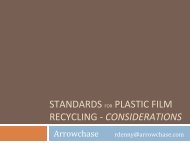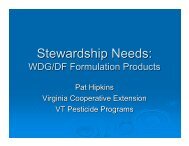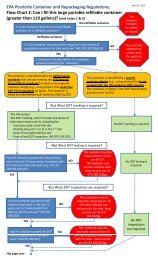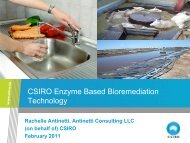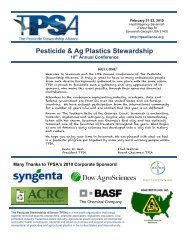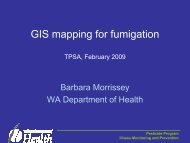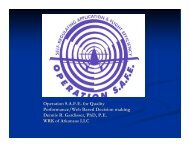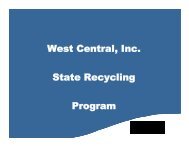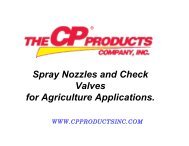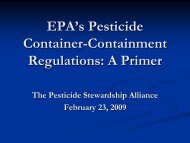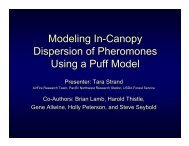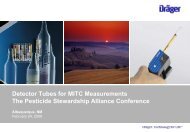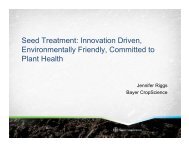Clean Sweep Programs - US Environmental Protection Agency
Clean Sweep Programs - US Environmental Protection Agency
Clean Sweep Programs - US Environmental Protection Agency
- No tags were found...
You also want an ePaper? Increase the reach of your titles
YUMPU automatically turns print PDFs into web optimized ePapers that Google loves.
Section 2 <strong>Clean</strong> <strong>Sweep</strong> Program OperationsFIGURE 1 State <strong>Clean</strong> <strong>Sweep</strong> Lead Agencies29 Dept. of Ag.5 Other Pes. Reg. <strong>Agency</strong>Department of Agriculture:6 Envir. <strong>Agency</strong>Other Pesticide Regulatory <strong>Agency</strong>:<strong>Environmental</strong> <strong>Agency</strong>:Other Lead <strong>Agency</strong> or Agencies:6 Other29 states5 states6 states6 statesmany cases, local extension agents or industryassociations, like the Farm Bureau and state retailassociations, have a working relationship withfarmers and can build support for <strong>Clean</strong> <strong>Sweep</strong>s.They may also have names and mailing addresses ofpotential participants, and they may be able to solicitvolunteers or collection sites. Finally, the leadagency (if it is the pesticide regulatory agency) mustdevelop a close working relationship with the statewaste agency to resolve any regulatory issuesinvolved with collecting, transporting and disposingof waste pesticides.2.2 What are the sources of <strong>Clean</strong><strong>Sweep</strong> program funding?<strong>Clean</strong> <strong>Sweep</strong> programs are funded, tovarying degrees, by state pesticide registration fees,other fee-based funds, state general funds,participant fees, EPA grants, county funds, in-kindservices, and other grants. States often utilize morethan one funding source and the source or sourcescommonly vary over time.Pesticide registration fees: States routinely collectregistration fees from pesticide companies for eachproduct sold within the state. A state undertaking acomprehensive <strong>Clean</strong> <strong>Sweep</strong> program will oftenraise the registration fee and use the additionalmoney to fund <strong>Clean</strong> <strong>Sweep</strong>s and other stewardship-orientedprograms. For example, the NorthCarolina GeneralAssembly enacted legislation in1993, creating an <strong>Environmental</strong> Trust Fund tosupport a statewide agromedicine program andpesticide environmental programs. This legislationreceived unprecedented broad support in NorthCarolina from environmental groups, industrygroups, commodity organizations, regulatoryagencies and legislators. Pesticide companiessupported paying additional fees in order to showtheir commitment to environmental stewardship.Seventy-five percent of the <strong>Environmental</strong> TrustFund budget is allocated to the Department ofAgriculture and Consumer Services for its pesticideprograms, including establishing an empty containermanagement program to enhance its pesticidedisposal program. The additional fees frompesticide registration are earmarked for containerrecycling rather than pesticide disposal.Also in 1993, Mississippi enacted theMississippi Waste Pesticide Disposal Law, whichauthorized an increase in state pesticide productregistration fees from $50 to $100 to fund apesticide collection and disposal program. A sunsetclause in the legislation limited the use of pesticideregistration fees for funding the disposal program tofive years. As a result, the program manager mustnow seek annual funding from other sources tocontinue pesticide collections.In March 2001, the Arkansas GeneralAssembly approved legislation that established anAbandoned Pesticide Disposal Program andauthorized the state Plant Board to collect $50 perregistered pesticide per year to fund the program.The Abandoned Pesticide Disposal Fee must be10



